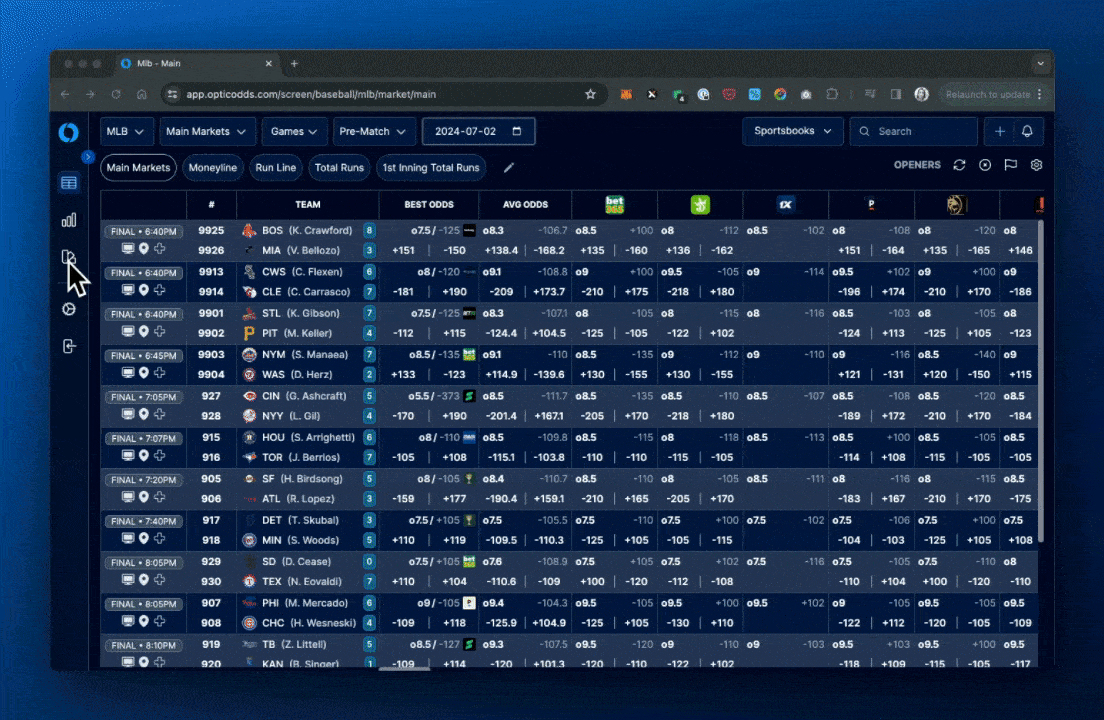Transparency For Thee
DraftKings is claiming it is being transparent in highlighting its yet-to-be-enacted surcharge on betting slips, but transparency is a two-way street.
The Bulletin Board
NEWS: New support for the repeal of the federal sports betting excise tax.
NEWS: DraftKings CEO cites transparency in defense of its announced surcharge.
NEWS: The Kids Online Safety Act could impact online gambling.
VIEWS: As much as they would like to, Minnesota’s racetracks are unlikely to get the legislature to authorize slot machines.
AROUND the WATERCOOLER: Regulators are listening to the bettor’s voice.
STRAY THOUGHTS: What a difference a year makes.
SPONSOR’S MESSAGE - Sporttrade was borne out of the belief that the golden age of sports betting has yet to come. Combining proprietary technology, thoughtful design, and capital markets expertise, our platform endeavors to modernize sports betting for a more equitable, responsible, and accessible future.
Sporttrade’s newest feature, The Tape, prints all trades made on the app in real-time.
Federal Sports Betting Excise Tax Repeal Gains Steam
Two US Senators, Catherine Cortez Masto (NV) and Cindy Hyde-Smith (MS), have introduced legislation to repeal the federal sports betting excise tax (.25% of handle) paid by licensed sportsbooks.
The legislation mirrors efforts in the House from Rep. Dina Titus (NV) and Guy Reschenthaler (PA).
Repealing the sports betting excise tax is one of the American Gaming Association’s top agenda items. Still, getting Congress to reduce the amount of money it collects has been a tough sell, particularly in the age of legal sports betting when the amount collected has increased exponentially.
Licensed sportsbooks send .25% of their handle to the federal government. The usage of those funds is unclear, but they are not used for problem gambling treatment or research. Unlicensed operators are supposed to pay 2%, but since they are already breaking US laws, they simply skirt this one, too.
So what we end up with is a punishment tax for operating legally.
Chris Grove offered up some other arguments against the tax on X:
The AGA has also made considerable progress on a separate policy item, increasing the slot reporting threshold.
“Per reporting from Vixio, it’s looking more likely, as a new report from the House Appropriations Committee, “The committee recognizes that the IRS Advisory Committee (IRSAC) Public Report published in November 2023, recommends the reporting threshold for Form W-2G to be increased to $5,000.”
DK CEO Defends Surcharge with Transparency Claim
During the company’s Q2 earnings call, DraftKings CEO Jason Robins provided numerous reasons (justifications) for the company’s proposed surcharge on winning bets in high-tax states. Many of the questions thrown at Robins followed a similar train of thought: Are you sure this is a good idea?
One of Robins’ justifications was transparency:
"We just thought that was most in line with how it's typically done versus trying to obfuscate it, which also isn't consistent with our commitment to be transparent to our customers and be very customer-friendly in everything we do."
The company’s presentation also included a transparency bullet point announcing the surcharge: “Ensuring transparency by identifying the gaming tax surcharge directly in the bet slip.”
At the same time, others are questioning the company’s commitment to transparency and fairness, arguing DraftKings is being selectively transparent.
During a recent hearing where the topic of limiting bettors was discussed, Massachusetts Gaming Commissioner Nakisha Skinner had questions about so-called transparency:
"I want to see case studies. How did this individual come to be limited? Data is where I come from. It's all about transparency and fairness. What communication is provided to the bettor when they are limited?"
“There’s been a lot of complaints about individuals not having communication from operators,” Skinner said during a May roundtable on limiting bettors. “Individuals can bet thousands of dollars, but when they start to win, they’re shut off.”
And as bettors have complained, sportsbooks don’t provide bettors with betting maximums before they place their wagers.
Robins was very transparent about one of the surcharge’s goals: to pressure states with or considering high tax rates and any state looking at raising its tax rate.
As Legal Sports Report’s Matthew Waters reported, “Robins was asked if DraftKings hoped showing this surcharge to the customer would start a grassroots push to lower taxes. He said yes. Hopefully, states will reconsider if they hear from locals or local teams.”
As I said in Monday’s newsletter:
“I have yet to meet the legislature that backs down to a not-so-subtle public threat. The way to convince lawmakers is behind-the-scenes cajoling. You convince lawmakers; you don’t make demands of them.”
SPONSOR’S MESSAGE - Join hundreds of operators using OpticOdds for trading, risk management, and Same Game Parlay analysis.
Real-time data and trading tools for sports betting + fantasy operators. Built by those who have done it before.
Looking to join the fastest-growing data provider in the sports betting industry? Join the team now.
Online Gambling Could Catch a Stray from Kids Online Safety Act
Very few bills receive as much support as the Kids Online Safety Act (KOSA), which passed the US Senate by a 91-3 vote. If passed by the House and signed into law, KOSA could have significant ramifications for online gambling, depending on how it is enforced.
KOSA “seeks to impose stricter regulations on online platforms frequently used by minors,” Casino Reports’ Erik Gibbs reported. “It mandates that the companies behind these platforms take substantial measures to prevent harm to young users.”
However, according to Wired, the fate of the bill in the House is undetermined. “House Republican leadership may not prioritize bringing the bill to the floor for a vote when legislators return” from a six-week recess, Wired reports.
One of the three Senators who voted against KOSA, Kentucky Sen. Rand Paul, said in a Courier-Journal op-ed that “KOSA would impose an unprecedented duty of care on internet platforms to design their sites to mitigate and prevent harms associated with mental health, such as anxiety, depression, and eating disorders. This requirement will not only stifle free speech, but it will deprive Americans of the benefits of our technological advancements.”
Paul and other detractors are concerned with the loosely defined “duty of care” language in the bill:
“The bill empowers the Federal Trade Commission to enforce the duty of care requirement to prevent mental health disorders, yet KOSA does not explicitly define the term “mental health disorder.” Instead, it references the fifth edition of the Diagnostic and Statistical Manual of Mental Health Disorders . . . or “the most current successor edition.” That means the scope of the bill could change overnight without any action from America’s elected representatives.”
Minnesota Tracks Unlikely to Become Racinos
*This entry cites an old article from the Star-Tribune, which I mistakenly believed was new:
Minnesota’s tribal casinos and commercial racetracks do not agree on much. In addition to extremely messy disagreements over sports betting and historical horse racing machines, the two groups are also on opposite sides when it comes to authorizing slot machines at the state’s two commercial racetracks.
As the Star-Tribune reports, the latest effort to authorize slots at racetracks “was the latest version of a perennial effort known as “racino,” which would expand gambling at Minnesota’s two racetracks, Running Aces and Canterbury Park.”
Tribes — that legally offer slot machines — are unsurprisingly against the idea.
According to John McCarthy of the Minnesota Indian Gaming Association, one tribe, the Mille Lacs Band, located near Running Aces, could lose 40-50% of its revenue.
“Our concern is that once this door is open, it doesn’t close,” McCarthy added. “It just goes on and on.”
Further complicating matters, the two racetracks aren’t even on the same page, as the Star-Tribune reports, “Running Aces distributed statements at the press conference noting they have concerns about whether the bill treats both tracks fairly.”
SPONSOR’S MESSAGE - Underdog: the most innovative company in sports gaming.
At Underdog we use our own tech stack to create the industry’s most popular games, designing products specifically for the American sports fan.
Join us as we build the future of sports gaming.
Visit: https://underdogfantasy.com/careers
Around the Watercooler
Social media conversations, rumors, and gossip.
A new player advocacy group founded by professional bettors Billy Walters and Gadoon “Spanky” Kyrollos isn’t being dismissed out of hand.
After it received a platform at the National Council of Legislators from Gaming States (NCLGS), the group gained the ear of decision-makers.
“I had the honor of being on a call yesterday with my colleague Richard Schuetz, representing The American Bettors’ Voice, speaking to 50+ regulators as part of The Sports Betting Regulatory Association. We felt very welcomed, and I believe change is inevitable. I encourage all operators/legislators/regulators to embrace our player advocacy group. Let’s work together to build a more sustainable sports betting industry.”
One regulatory body that is very interested in what the “players” have to say is the Massachusetts Gaming Commission, which is leading the charge on the topic of limiting bettors.
A memo to MGC Commissioners ahead of an August 1, 2024 meeting noted, “Each Operator has since expressed commitment to have an Operator-only discussion with the Commission regarding this issue during a public meeting or round table.”
The memo also notes that operators have pointed out that “some of the leaders of the sharp bettor community have been convicted of gaming-related criminal felonies. Sharps engage in various ways to get around limits.”
However, as SBC Americas reports, MGC Commissioner Eilleen O’Brien doesn’t feel that is disqualifying:
“They make some valid points about some of the voices that are on the bettor’s side. But that does not mean necessarily, that what’s being said is not valid in the conversation. I don’t want to cut players out.”
Stray Thoughts
Last year, on the paperwork for my annual physical, my height was listed as 5’10 7/8”.
This year, we got even more precise (and apparently, I’ve grown a little), as I’m now 5’10.98”. I know guys like to lie about their height, but we can’t round up 5’11” here.
And speaking of last year, this is the One-Year Anniversary of the Straight to the Point newsletter. Here is the first newsletter from August 7, 2023, if you want to take a trip down memory lane: I Eat Cannibals.









